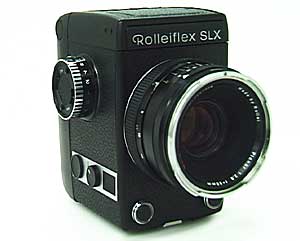


Following Rollei's first 6 x 6cm SLR camera, RolleiFlex SL66 launched in 1970, RolleiFlex SLX came in the market in 1976 that employed the leaf shutter, AE system and auto-winding mechanism.While SL66 employs the focal-plane shutter, SLX employs the leaf shutter as well as Hasselblad cameras, and also it adopts the shutter-speed-priority automatic exposure system. Beside, building the motor drive into the camera enables it to wind the film automatically. All these things considered, it can be said that RolleiFlex SLX was launched as not just an upgrade version of SL66, but a totally new model.
The camera body itself is designed rather compact even though it has the motor drive in it. And its shape is not like the Hasselblad-like body but rather like Kowa Six cameras. The lenses for the camera were manufactured by Rollei Werke under the license of Carl-Zeiss. The available lenses are as follows: Standard lens; Planner f2.8/80mm HFT, Wide-angle lens; Distagon f4/40mm, Telephoto lens; Zonnar f5.6/150mm, and several others. All these lenses are HFT lenses, means that they are multi-coated. Although the camera employs the leaf shutter, the shutter speed dial is located on the body side, and every shutter speeds synchronize the flash. The shutter release buttons are located at each corner of the camera front bottom. TTL meter is built in the camera body, which makes it possible for the camera to adopt the interchangeable viewfinder system without any difficulty. Its photo-electric element is silicon photo-diode and it adopts the center-weighted light reading. Power resources of the camera is nickel-cadmium battery and it can be charged about a thousand times.
A wide variety of accessories are provided with RolleiFlex SLX such as the prism eye-level finder, the quick focusing lever that makes it easy to focus, five kinds of the focusing screens, the pistol grip with electro-magnetic release, and 5 meter or 10 meter-long electro-magnetic release, and also for the close-up photography, the bellows extending up to 20 cm and four kinds of the extension tubes.
- First introduced in 1976.
- Camera type : 6 x 6cm leaf-shutter AE SLR camera
- Film : 120 roll film (12 exp.), 220 roll film (24 exp.)
- Standard lens : Planner f2.8/80mm (five-group, seven-element)
- Closest focusing distance : 0.9 m.
- Shutter : linear motor leaf shutter
- Shutter speeds : B, 30 - 1/500sec.
- Focusing : helicoid focusing
- Viewfinder : collapsible waist-level finder
- Focusing screen : split-microprism
- Exposure meter : full-aperture center-weighted light reading AE, utilizing silicon photo-diode
- Film speed range : ASA 25 - 6400
- Power resources : 9.6V nickel-cadmium battery
- Film winding : auto-winding, winding speed / 0.7sec., continuous taking enabled.
- Frame counter : automatic-resetting, forward counting frame counter
- Body dimensions : 85 x 138 x 162 mm (with standard lens)
- Body weight : 1800 g. (1250 g. without lens)
|
| Back to Camera Shopper | Back to Index Page |